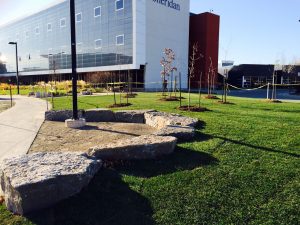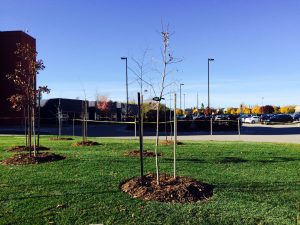
BY CHRISTY JANSSENS
The green space at Sheridan’s Trafalgar Campus is getting a facelift.
Phase one of the new pollinator friendly garden in front of J wing, an initiative started by the Office of Sustainability, is complete. The garden is replacing what was previously an overgrown thicket of buckthorn, fully removed in November 2015. According to Wai Chu Cheng, coordinator of sustainability at Sheridan, buckthorn was an issue for two reasons.
“Number one,” she said, “buckthorn is invasive.” This meant that it was choking out other species. The second issue, says Cheng, was safety. The buckthorn was so overgrown that it prevented a clear sight line in that area of campus.
The completed phase one of the new design includes 11 new native trees. According to Cheng, more topsoil was also added to help the trees’ roots to grow better. The site also features a semi-circle of armour stone. “It feels more natural than benches,” said Cheng. “It’s durable outdoor seating. The idea is that people can sit there as kind of a gathering place to relax and enjoy the garden.”

Phase two, according to the Sheridan Insider, will focus on installing a medicine garden. “It’s actually a circular design with four quadrants,” says Cheng. “The four quadrants are made of native plants and they come out in different colours during different seasons.”
Planting native species in the new garden is important. “Native species tend to adapt better to the local climate,” says Cheng. “Also, native species are able to attract pollinators.”
The garden comes from an Ojibwe teaching about the medicine wheel, which is divided into four quadrants. According to Paula Laing, initiatives coordinator for the Indigenous Centre for Learning and Support at Sheridan, these four quadrants represent the four directions: north, south, east and west.
“This wheel also talks about us as people,” she says. “It’s a whole theory of life.” According to Laing, the wheel represents a journey through four stages of life: childhood, youth, adulthood and, finally, becoming an elder.
“That garden is supposed to emulate the teachings,” says Laing. She also says that they hope to plant different medicines such as sage, wheatgrass, Indian tobacco and strawberries.
TD Friends of the Environment Foundation has been a key financial support in this project. “We want to express our gratitude to our sponsors,” says Cheng. She also says that they are in the process of putting out applications to different organizations to fund phase two. Once the funding comes in, they will ask for volunteers to help plant the garden. The hope is that this will take place in the spring.
Although the new space will be a beautiful addition to Trafalgar Campus, it is about more than just looks.“[Nature is] essential,” says Cheng. “It’s not just decoration. Life actually depends on nature.”
Laing shares a similar perspective.
“There’s a whole other teaching about when you plant,” she says. “We actually sing to the seeds before we plant them. We treat the seeds, and anything we plant, as if it were our brothers and sisters. You have to treat it with respect so it will give you life in return. It’s that whole notion of reciprocity: that whatever we do in life, it affects everything else in this cycle. So when we plant within community, it brings the community together. This circle helps bring the community together.”
